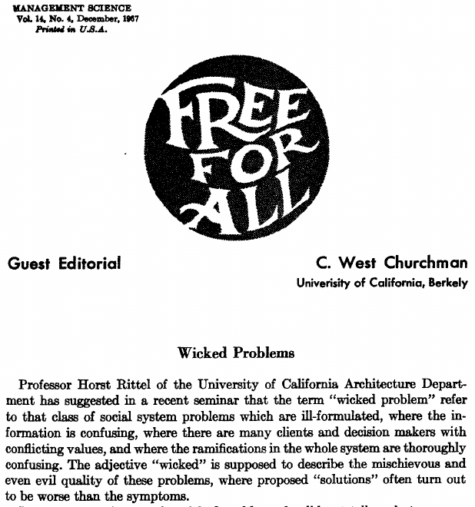The ties between systems thinking and pragmatism are apparently strong, but the breadth in the philosophy of pragmatism can be confusing. Within the tradition, one of the threads is called nonrelativistic pragmatism, proposed by systems luminaries C. West Churchman with Russell L. Ackoff, descending from the work of philosopher Edgar A. Singer, Jr.
A concise description of nonrelativistic pragmatism might be as a branch that centers on the entanglement of facts and values, within philosophy of science. This centering surfaces in an interview of Hilary Putnam, expanded from the two into a “triple entanglement of theory, value, and fact”.
… Read more (in a new tab)My alma mater was the University of Pennsylvania. The first teacher who really influenced me there was a pragmatist. His is an interesting story. His name was C. West Churchman. (I do not know what his first name was, because he obviously did not like it.) He was a philosopher of science for a while, but then he eventually left the field of philosophy, and became Professor of Operations Research at the University of California. He was a pragmatist, and he was a student – which makes me a “grandstudent” – of a philosopher named E. A. Singer Jr., who was in turn a student of William James. Singer created a pragmatist tradition at the University of Pennsylvania. The other pragmatist at that point – she did not even have tenure, she was just an assistant professor but later she became a full professor – was Elizabeth Flower.
The ties between systems thinking and pragmatism are apparently strong, but the breadth in the philosophy of pragmatism can be confusing. Within the tradition, one of the threads is called nonrelativistic pragmatism, proposed by systems luminaries C. West Churchman with Russell L. Ackoff, descending from the work of philosopher Edgar A. Singer, Jr.
A concise description of nonrelativistic pragmatism might be as a branch that centers on the entanglement of facts and values, within philosophy of science. This centering surfaces in an interview of Hilary Putnam, expanded from the two into a “triple entanglement of theory, value, and fact”.
… Read more (in a new tab)My alma mater was the University of Pennsylvania. The first teacher who really influenced me there was a pragmatist. His is an interesting story. His name was C. West Churchman. (I do not know what his first name was, because he obviously did not like it.) He was a philosopher of science for a while, but then he eventually left the field of philosophy, and became Professor of Operations Research at the University of California. He was a pragmatist, and he was a student – which makes me a “grandstudent” – of a philosopher named E. A. Singer Jr., who was in turn a student of William James. Singer created a pragmatist tradition at the University of Pennsylvania. The other pragmatist at that point – she did not even have tenure, she was just an assistant professor but later she became a full professor – was Elizabeth Flower.



